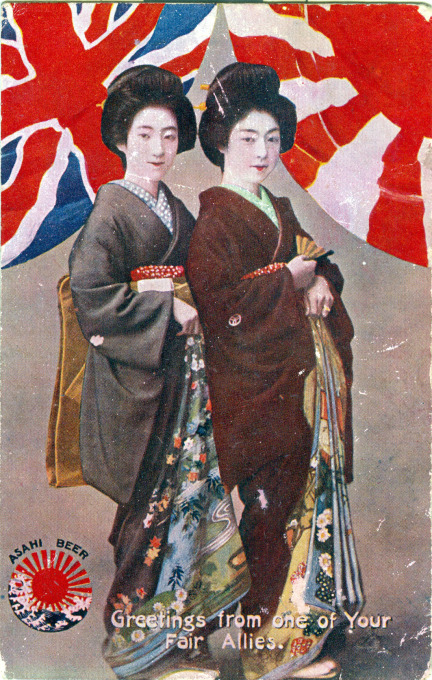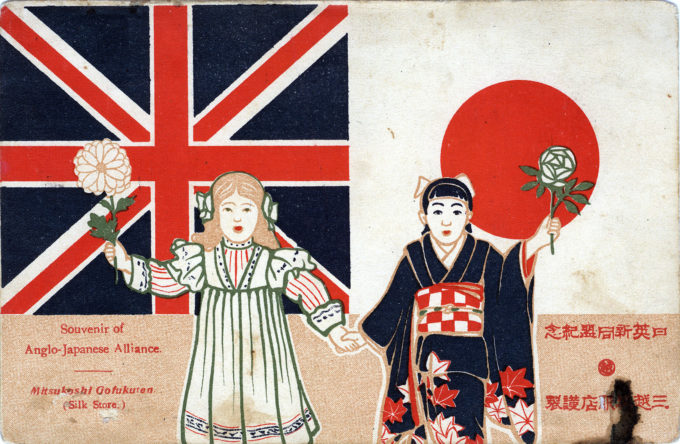
“Greetings from one of Your Fair Allies.” An advertising postcard published by the Osaka Beer Brewing Company, c. 1905, for its then-newly-launched Asahi bottled draft beer. Osaka Breweries would merge in 1906 with Japan Beer Brewery, Ltd. (Kirin beer) and Sapporo Beer Co. (Sapporo beer) to form Dai Nippon Breweries. During the First World War, and purely coincidental to the establishment of the Anglo-Japanese alliance, German prisoners-of-war were put to work in the Asahi brewery.
See also:
Russo-Japanese War, 1904-1905
Yebisu Beer, Tokio Brewery No. 1, Meguro, c. 1900
Nippon Beer, c. 1950
“The story of the Anglo-Japanese alliance has all the elements of a romance.
“Born out of a common desire of Japan and Great Britain to defend their vital interests in the Far East which were being seriously menaced towards the end of the nineteenth century by the slow but steady encroachment by Russia in Manchuria, North China, and Korea, it was not, however, consummated until a series of political vicissitudes and diplomatic reverses which both Powers had suffered convinced them of the community of their interests and the advantages of a defensive alliance.
“It is an open secret that long before ever considering Japan as a worthy partner, Great Britain had riveted her eyes upon China whom she had regarded as a potential ally rich populous and strong enough to cope with the Russian Colossus. These two countries, Russia and Great Britain, had been traditional enemies. Their interests conflicted in the Far East, in the Middle East, and in the Near East. Russia was in secret alliance with France ever since 1891, and with the assistance of ally she was able to have everything very in her own way in Europe as well as in the East. On the other hand, without a political partner, Great Britain was forced to play a lone hand in all Eastern affairs.
“It was then, as it is to-day, a cardinal point of the British foreign policy to defend British interests in India at all costs.”
– China, the United States, and the Anglo-Japanese Alliance, by Ge-Zay Wood, 1921

“Souvenir of Anglo-Japanese Alliance”, c. 1905, published by Mitsukoshi Gofukuten (department store). The diplomatic milestone that saw an end to Britain’s ‘splendid isolation’. The Anglo-Japanese alliance was renewed and expanded in scope twice, in 1905 and 1911, before its demise in 1921. It was officially terminated in 1923.
“The proposal to create an alliance between England and Japan had its origins in Russian policy in the Far East. As noted earlier, after the conclusion of the Sino-Japanese War, the Japanese had been forced by three European powers to return the Liaotung Peninsula to China. However, Russia not long afterward leased this territory, signed a secret treaty with China, and began constructing a railway. The Russians now administered Port Arthur and Dairen and were steadily expanding their hold over northwestern China.
“… Other countries with interests in East Asia were concerned about Russia’s moves [into] Korea, and many believed that a clash between Russia and Japan was inevitable. However, the Japanese were by no means adequately prepared for such a conflict, and it was obvious that it would be extremely difficult for the country, unaided, to dislodge the Russians.
“Japan had two possible courses of action. One (favored by Ito Hirobumi) was to reach an understanding with Russia whereby Manchuria would be yielded to the Russians. The other (favored by most other Japanese officials) was for Japan to act in concert with major European powers in order to contain Russia.
“… A pro-Japanese mood swept England in 1900 after the Japanese rescued British subjects in Peking besieged by the Boxers. Hayashi Tadasu, who became minister to Great Britain that year, concluded that England was the only country with which Japan could form an alliance against Russia … In April 1901, in conversation with [British Secretary of State for Foreign Affairs] Lord Lansdowne, Hayashi had voiced the opinion that in order for there to be permanent peace in East Asia, a firm relationship between Japan and England was essential. Lansdowne agreed.
“… On January 30, 1902, Hayashi and Lansdowne signed the Anglo-Japanese treaty in London, and it was announced to the public on February 12.
“It is not difficult to appraise the benefits to Japan brought by the treaty. Hayashi believed that the alliance enabled Japan’s victory in the Russo-Japanese War. It accounted for Japan’s participation in World War I and its acquisition of an overseas empire when it captured former German colonies in the South Pacific. More important than material benefits was the joy felt by the Japanese, from the emperor on down, that Japan had been recognized as an equal partner of the strongest nation in the world, a nation that in the past had humiliated Japan again and again.”
– Emperor of Japan: Meiji and His World, by Donald Keene, 2002


Pingback: Japan-US Relations, c. 1908. | Old Tokyo
Pingback: Japan-British Exhibition, London, 1910. | Old TokyoOld Tokyo